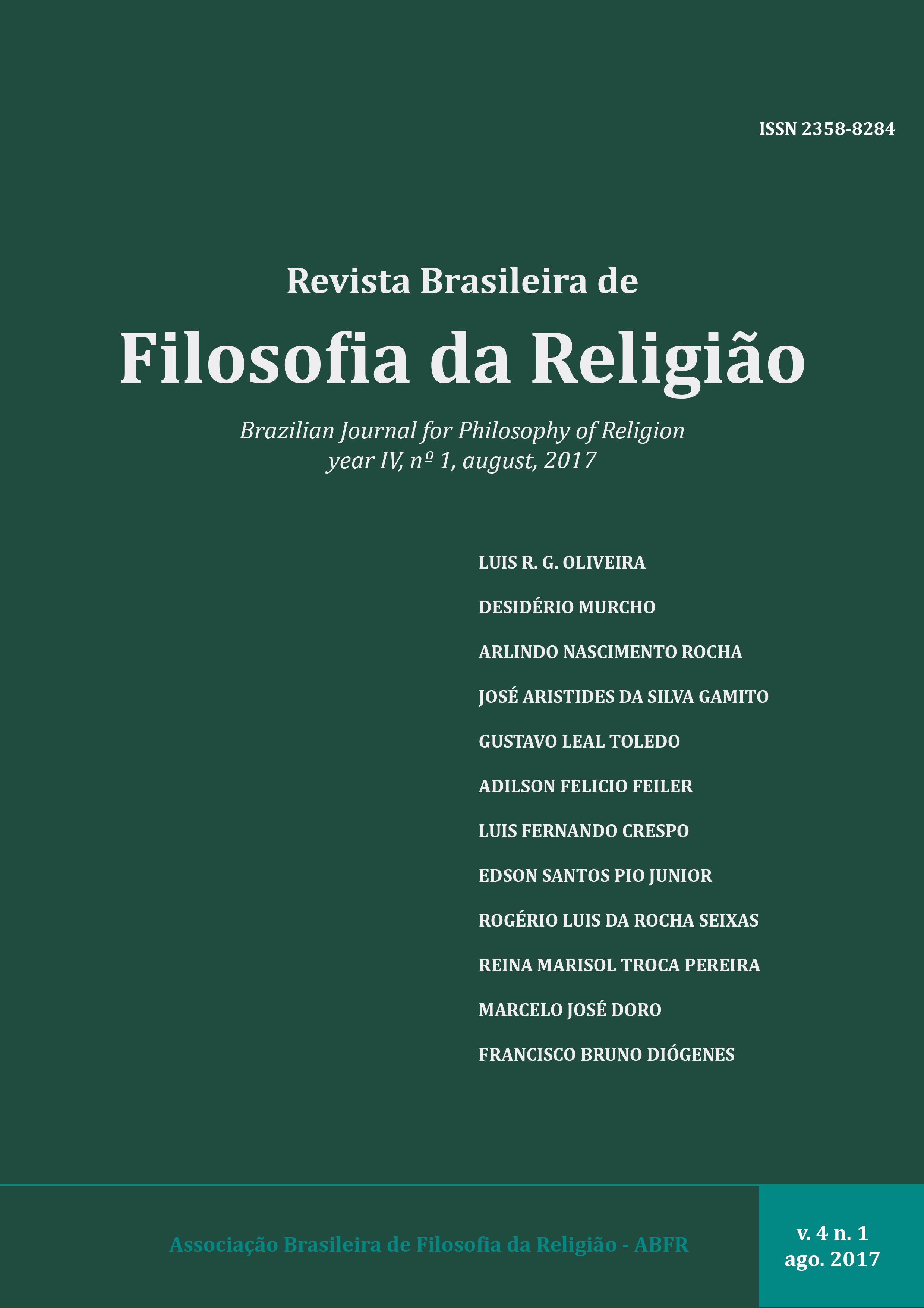OIKONOMIA, STATE OF EXCEPTION AND ESCHATOLOGY: THE FIGURE OF THE KATECHON IN THE THEOLOGICAL GENEALOGY OF THE GOVERNMENTALITY OF GIORGIO AGAMBEN
DOI:
https://doi.org/10.26512/2358-82842017e17705Keywords:
Governmentality, exception, oikonomia, eschatology, katechon.Abstract
This article intends to highlight the bible and eschatological figure of katechon within the work of the Italian contemporary philosopher Giorgio Agamben. The idea of this text would visit the "theological genealogy of economy and government " undertaken by the philosopher from, especially, his book The Kingdom and the Glory [2007], but with the theoretical contribution of other written, fundamental to this theme, as The time that remains [2000] and The mystery of evil [2013]. This is, then, to carry out a genealogy within the perspective of what is called governmentality, what means, in the case of Agamben, also having in view the concept of exception as the fundament and political technique of government of men. But, in the meantime, it is essential better understand the theological and eschatological themes of the oikonomia and katechon ”“ this last, best worked in this article ”“, investigated by Agamben in such works, as they are constitute key-notions to this reflection of the author.
Downloads
References
AGAMBEN, Giorgio. Estado de Exceção ”“ Homo sacer II,1. [2003] 2ª ed., Tradução de Iraci Poleti. São Paulo: Boitempo, 2007.
______. Homo Sacer. O poder soberano e a vida nua I. [1995] Tradução de Henrique Burigo. Belo Horizonte: Editora UFMG, 2002.
______. El misterio del mal. Benedicto XVI y el fin de los tiempos. [2013] Tradução de María Teresa D’Meza. Buenos Aires: Adriana Hidaldo editora, 2013a.
______. Il mistero del male ”“ Benedetto XVI e la fine dei tempi. [2013] Roma-Bari: Editori Laterza, 2013b.
______. O mistério do mal ”“ Bento XVI e o fim dos tempos. [2013] Tradução de Silvana de Gaspari e Patricia Peterle. São Paulo: Boitempo; Florianópolis: Ed. da UFSC, 2014.
______. O que é um dispositivo? In.: O que é o contemporâneo? E outros ensaios. [2006-2008] Tradução de Vinicius Nicastro Honesko. Chapecó: Argos, 2009
______. O Reino e a Glória. Uma genealogia teológica da economia e do governo ”“ Homo sacer II, 2 [II, 4]. [2007] Tradução de Selvino José Assmann. São Paulo: Boitempo, 2011.
______. O tempo que resta ”“ Um comentário à Carta aos Romanos. [2000] Tradução de Davi Pessoa. Belo Horizonte: Autêntica Editora, 2016.
______. Signatura rerum. Sul metodo. [2008] Torino: Bollati Botinghieri, 2008.
ALVES, Luís Flávio. A Eclesiologia Latino-americana como acolhimento criativo do Vaticano II: Um caminho para uma nova recepção da herança conciliar. 2011, 173 f. Dissertação de Mestrado (Mestrado em Teologia) - Centro de Teologia e Ciências Humanas, Pontifícia Universidade Católica do Rio.
ARISTÓTELES. Política. Tradução de Mário da G. Kury. 3ª ed. Brasília: Ed. UNB, 1997.
FOUCAULT, Michel. Segurança, território e população. [1977-1978] Tradução de Eduardo Brandão. São Paulo: Martins Fontes, 2009.
GADELHA, Sylvio. Biopolítica, governamentalidade e educação. Introdução e conexões, a partir de Michel Foucault. Belo Horizonte: Autêntica, 2009.
HONESKO, Vinícius Nicastro. O paradigma do tempo. Walter Benjamin e Messianismo em Giorgio Agamben. Florianópolis: NPL, Ed. do Autor, 2009 - Revista Filosofia Política do Direito ”“ AGON; V. 3.
NASCIMENTO, Daniel Arruda. Inoperosidade. In: Umbrais de Giorgio Agamben: Para onde nos conduz o Homo sacer? São Paulo: Editora LiberArs, 2014.
ROMANDINI, Fabián Ludueña. La comunidad de los espectros. I Antropotecnia. Buenos Aires: Miño y Dávila Editores, 2010.
_____. El mesianismo agambeniano entre Cacciari y Žižek. Una arqueología del katéchon. In.: Revista Profanações. [on-line] Mafra: Santa Catarina, Ano 3, n. 2, p. 4-30, jul./dez. 2016.
ROSENSTOCK-HUESSY, Eugen. A origem da linguagem. [1981] Tradução de Pedro Sette Câmara. Rio de Janeiro/São Paulo: Record, 2002.
SCHMITT, Carl. Teologia política. [1922] Tradução de Elisete Antonik. Belo Horizonte: Del Rey, 2006.

